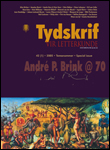Reading sex and violence in André Brink's Rumours of Rain and A Dry White Season
DOI :
https://doi.org/10.4314/tvl.v42i1.29692Mots-clés :
André Brink, Rumours of Rain, Dry White Season, sex, violenceRésumé
This essay examines the relationship between narrative excess and narrative restraint, arguing that the bedchamber becomes a troubling surrogate for the ideologically and aesthetically hazardous journey into the torture chambers of the apartheid state. Drawing on the work of Rosemary Jolly as well as on J.M. Coetzee's "Into the Dark Chamber" and Brink's own "Literature and Offence," which imagines the novel as a woman who teases the male reader with the promise of easy satisfaction, but then withholds her favours and provokes him to a heightened awareness of political responsibility, the paper proposes that Brink's pornographic descriptions of white women's bodies are intended to stage the larger seduction and political awakening of the male reader, and to substitute for the vanishing and covertly violated bodies of black men. In A Dry White Season (1979) and Rumours of Rain (1978) Brink makes the sexuality of the female body abundantly available to the reader (as well as to the men in the novels, and a host of voyeurs) precisely because he cannot risk turning the obscenity of torture into an object of aesthetic pleasure. This algebraic solution to the quandary of representing violence, in which one set of minutely-observed bodies substitutes for another in the name of ethical awakening, creates as many ideological and aesthetic problems as it resolves.
Téléchargements
Références
...
Téléchargements
Publiée
Numéro
Rubrique
Licence
(c) Copyright Tydskrif vir Letterkunde 2005

Ce travail est disponible sous licence Creative Commons Attribution - Partage dans les Mêmes Conditions 4.0 International.


 https://orcid.org/0000-0001-6465-6584
https://orcid.org/0000-0001-6465-6584


.png)